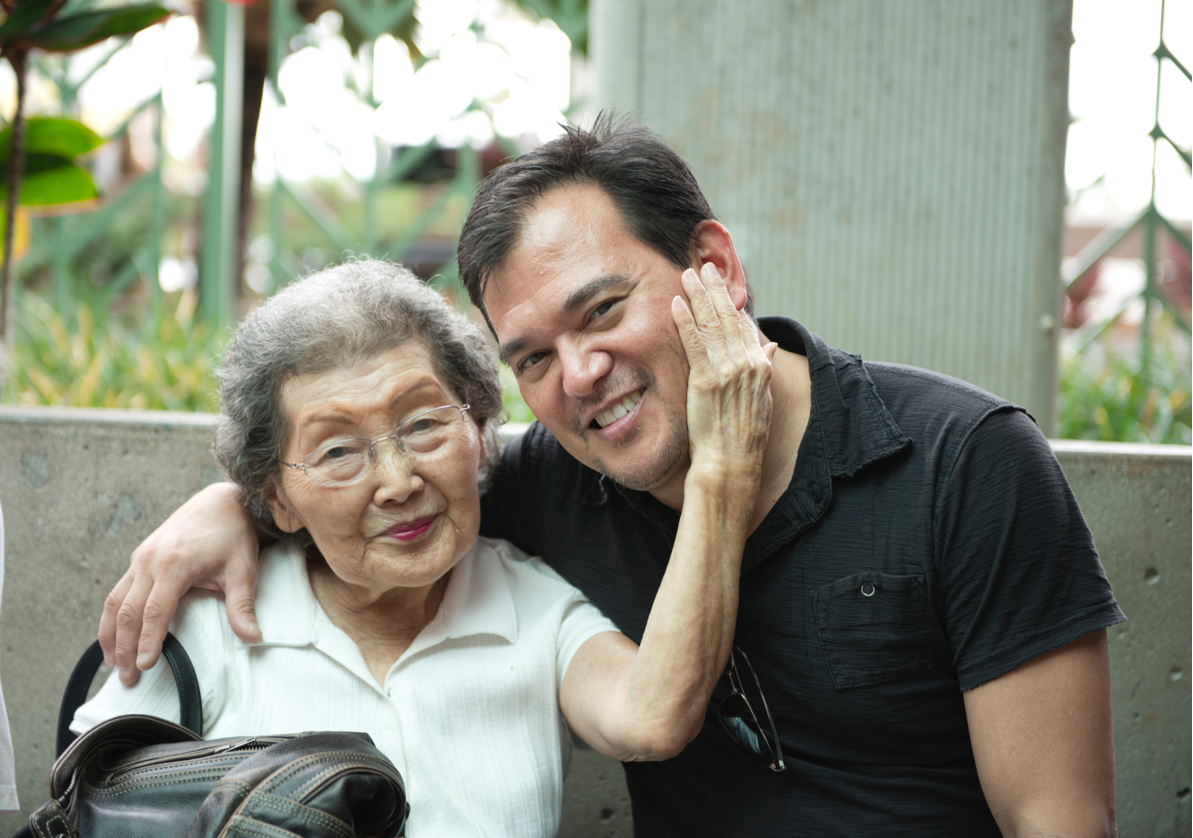Using The Skills Of Neuroleadership In Caring For A Loved One With Alzheimers
Over the past year, neuroscience, and in particular, its application in leadership, or Neuroleadership, has become the focus of my professional life. From day one, stepping into this field of research and study into the wonders of the human brain has felt familiar in many ways--the logical destination for someone who has spent 20 years working and learning in organizations like Zenger-Miller (leadership), Genos International (emotional intelligence, employee motivation and engagement), and Herrmann International, the company behind the seminal global thinking styles assessment, the HBDI.
I draw from those past experiences in my current work every day. The  affirms all of my learning from the last two decades, that feeling of familiarity perhaps the result of existing neuropathways firing up again in unison. Of past life aligning to present. And even more powerfully, of present work aligning to present life.
affirms all of my learning from the last two decades, that feeling of familiarity perhaps the result of existing neuropathways firing up again in unison. Of past life aligning to present. And even more powerfully, of present work aligning to present life.
I believe the application of neuroscience in the workplace, particularly in leadership, has become a critical success factor for business. Further, it’s important to recognize how vital these skills are for life outside of work as well.
How the behaviors of the i4 Neuroleader Model (in particular) also equip us to deal with situations that are even more charged with significance than a workplace scenario because they involve someone we love—a spouse, partner, sibling, or in this particular story, an aged parent.
About seven years ago, I started to notice some changes in my mother. At the time, we lived 5,000 miles from each other, so I would only get to see her two or three times a year. But when I did see her, I started to notice some shifts in her behavior.
Some of it was memory related—not unexpected for a 79-year old. But there were personality shifts as well. Activities that in the past would bring her joy, no longer interested her. Phone calls grew shorter. She became increasingly withdrawn.

Earlier this year, we passed the six-year anniversary of her formal diagnosis-- Alzheimer’s disease. Those subtle changes that I noticed have morphed into the late-stage of the disease--complete loss of short-term memory, aggressive behavior, and delusions.
I have watched movies about Alzheimer’s, read books and articles—and none of them prepare you for the reality of it. Of the emotional impact of watching a loved one lose their memories, their personality, and the very essence of who they once were.
Or of the impact this has on your entire family. If you’ve experienced this yourself, you must know what I’m describing. How do you actually describe this experience to others? “Heartbreaking,” seems to nail it in a single word. “Helplessness” might be a good runner up.
As the disease progresses, you too morph into someone or something else— accessing parts of yourself you didn’t know existed. You become the responsible one, the caretaker. You become the parent.
And all of this happens on a parallel track—next to your work, next to your own life, your spouse and your friends. Stress levels go through the roof. In your quiet moments, you wonder how you will cope—help her, help your family, and keep your own sanity.
Recently, I moved my parents from their home of 56 years in Hawaii to California—to live with me and my husband so we could participate in their day to day care.
As we adjusted to this new life together, I found myself spending time every day with my mother and my father (who is cognitively robust, but physically frail).
Soon, I began to recognize that I was unconsciously channeling a number of the behaviors of the i4 Neuroleader Model, which is not surprising because it is a personal leadership model—it applies equally to work and personal life contexts. And, it is also a well-being model.
Develop the skills of the i4 Neuroleader and you will also adopt practices and lifestyle choices that result in greater levels of centeredness, positivity, and resilience.
In the world of caring for someone with Alzheimer's—strategies that make life more bearable (for them and for you) may make the difference between getting through it in one piece or having your own stress-related meltdown—physical, emotional, or psychological.
So, what specific skills of the i4 Neuroleader are most relevant, most useful, in caring for someone with Alzheimer's? I have found three in particular that I access every day:
Awareness
Awareness is at the core of the i4 Model. You can’t begin a developmental journey—Neuroleader or otherwise, without it. It is also one of the pillars supporting the workplace outcome of agility. And it is the core of Alzheimer's care-giving.
- How are you feeling when you walk into a room?
- What is your mood?
- How is this manifesting itself in terms of your tone of voice, your body language, facial expressions, and things you say or don’t say?
Having greater levels of awareness will give you enhanced ability to manage and control your emotions in these situations, but more importantly, to manage the emotions of your loved one, and the people who are also providing care for them.
Mental Readiness
While my mother’s memory is gone, her perceptiveness around a person’s energy is very much intact—perhaps even heightened.
When I approach her with lightness, humor, optimism, and laughter—she senses this and reflects this mood state back to me. When I approach her sad, depressed, stressed, distracted—that mood state is reflected back as well.
Your energy and the energy of those surrounding your loved one can make the difference between ‘good’ days and ‘bad’ days. It can diffuse potentially explosive mood changes. It can keep an otherwise difficult situation (loss of memory) more manageable.
Mental readiness—or the ability to create a balanced psychological state, is a another skill of the i4 Neuroleader. It also translates into your ability to shift your emotional state, and to channel positive emotions while under stress.
Attitude
Since their move to California, and with more opportunities for contact and observation, I began to notice a behavioral pattern in my father--a framing of the situation and of his perception of my Mom—a woman who much of the time no longer recognizes who he is, even though they live in the same house and interact with each other every day.
During his more open moments, he would confess his sadness, his despair, at the changes in his lifelong partner...
She isn’t the same person anymore” he would say. “It’s like I’ve already lost her.
And I remember that I, too, during my visits home before their move, would be gripped by feelings of sadness and depression as I experienced my mother—a woman completely unrecognizable from the feisty, life force that I always knew and who sometimes didn’t recognize me as her own child. My father was right. She wasn’t the same person anymore.
And then, late one night, after my father had gone to bed, I sat next to my Mom as she put her hair up into rollers (as she had done for as long as I could remember). We had dessert together and talked.
And for an hour, it felt like I was with my old Mom, the Mom I had always known. She was lucid, connected, and her conversation was clear and unfettered by memory loss. I sat next to her, and I gave her a long hug and a kiss, which she returned. It was a precious and treasured moment.
The next day, she was gone again—lost in an Alzheimer’s-induced haze. But rather than being sad or depressed, I managed to access a different emotion, a different mindset.
I recalled the night before, that precious hour I spent with her. And rather than framing my experience of her with the past, I made a conscious effort to frame my experience of her with the present. Rather than being sad about losing the mother I once knew, I channeled feelings of gratitude and joy for the moment I had with her the night before.
That shift in my cognitive framing, (the i4 Model skill of attitude) in that one moment, allowed me to approach my mother and her illness in an entirely different manner.
To look for moments of gratitude and joy, and to be aware of them. To know them, and to experience happiness because she is still with me, and because there are still good moments to experience.
And I shared this revelation with my father, and gave him a little coaching session on how he too, might frame his experience of his wife in the present, rather than in the past. At 87, my father is from a generation that doesn’t express emotion yet alone knows anything about the field of neuroleadership.
They say you can’t teach an old dog new tricks, but I watched him practice this new way of thinking. And over time, I gradually watched his experience of my mother shift as well.
I would be lying if I said I still don’t have days where I wallow in sadness and despair. But mostly now, I am thankful. And my father has become the poster child for positivity and optimism in the face of adversity.
If you have an aged parent or loved one suffering from alzheimers, my heart goes out to you.
There is nothing I can say that hasn’t been said to you a thousand times by well-meaning friends and family members. But there is one thing you can do.
If you can channel these three skills—awareness, mental readiness, and attitude, perhaps you too might find some solace in a painful and difficult situation. Perhaps you too will be able to access feelings of gratitude and joy, and help your family members to do the same.
- i4 Neuroleader (353)
- Leadership & Culture (336)
- Brain Health & Wellbeing (206)
- Innovation (97)
- Performance (85)
- Our News (79)
- Collaboration (68)
- Agility (53)
- Practitioner Stories (44)
- In The Press (36)
- Make Me A Leader (33)
- Balance (31)
- Integration (30)
- Imagination (29)
- Awareness (23)
- Brain-Friendly Channel (22)
- Brain-Friendly Leadership (22)
- Communication (22)
- Curiosity (21)
- Inspiration (19)
- Intuition (19)
- Attitude (17)
- Courage (16)
- Adaptability (14)
- Case Studies (14)
- Drive (14)
- Generosity (13)
- Ethics (9)
- Mental Readiness (9)
- Influence (8)
- Retreat (8)
- Brain-Friendly Leadership (1)
- Oracle Cards (1)
- 1 November 2025 (2)
- 1 September 2025 (3)
- 1 August 2025 (5)
- 1 July 2025 (5)
- 1 June 2025 (2)
- 1 April 2025 (1)
- 1 March 2025 (8)
- 1 February 2025 (3)
- 1 September 2024 (4)
- 1 July 2024 (2)
- 1 June 2024 (6)
- 1 May 2024 (2)
- 1 April 2024 (3)
- 1 March 2024 (1)
- 1 November 2023 (1)
- 1 August 2023 (1)
- 1 July 2023 (2)
- 1 June 2023 (2)
- 1 May 2023 (4)
- 1 April 2023 (2)
- 1 March 2023 (7)
- 1 February 2023 (4)
- 1 January 2023 (1)
- 1 September 2022 (1)
- 1 May 2022 (3)
- 1 April 2022 (1)
- 1 March 2022 (5)
- 1 February 2022 (4)
- 1 January 2022 (4)
- 1 December 2021 (2)
- 1 November 2021 (4)
- 1 October 2021 (3)
- 1 September 2021 (6)
- 1 August 2021 (1)
- 1 April 2021 (1)
- 1 December 2020 (2)
- 1 November 2020 (1)
- 1 September 2020 (1)
- 1 August 2020 (1)
- 1 July 2020 (3)
- 1 June 2020 (4)
- 1 May 2020 (3)
- 1 April 2020 (4)
- 1 March 2020 (6)
- 1 February 2020 (4)
- 1 January 2020 (2)
- 1 December 2019 (3)
- 1 November 2019 (3)
- 1 October 2019 (5)
- 1 September 2019 (4)
- 1 August 2019 (4)
- 1 July 2019 (4)
- 1 June 2019 (5)
- 1 May 2019 (9)
- 1 April 2019 (9)
- 1 March 2019 (8)
- 1 February 2019 (7)
- 1 January 2019 (8)
- 1 December 2018 (5)
- 1 November 2018 (10)
- 1 October 2018 (16)
- 1 September 2018 (9)
- 1 August 2018 (10)
- 1 July 2018 (9)
- 1 June 2018 (8)
- 1 May 2018 (9)
- 1 April 2018 (9)
- 1 March 2018 (9)
- 1 February 2018 (8)
- 1 January 2018 (8)
- 1 December 2017 (6)
- 1 November 2017 (9)
- 1 October 2017 (9)
- 1 September 2017 (8)
- 1 August 2017 (10)
- 1 July 2017 (8)
- 1 June 2017 (8)
- 1 May 2017 (9)
- 1 April 2017 (8)
- 1 March 2017 (6)
- 1 January 2017 (3)
- 1 December 2016 (4)
- 1 November 2016 (5)
- 1 October 2016 (4)
- 1 September 2016 (2)
- 1 August 2016 (4)
- 1 July 2016 (4)
- 1 June 2016 (2)
- 1 May 2016 (3)
- 1 April 2016 (3)
- 1 March 2016 (7)
- 1 February 2016 (2)
- 1 January 2016 (5)
- 1 December 2015 (2)
- 1 November 2015 (2)
- 1 October 2015 (4)
- 1 September 2015 (2)
- 1 August 2015 (2)
- 1 July 2015 (1)
- 1 June 2015 (3)
- 1 May 2015 (4)
- 1 April 2015 (5)
- 1 March 2015 (3)
- 1 February 2015 (3)
- 1 January 2015 (3)
- 1 December 2014 (3)
- 1 November 2014 (3)
- 1 October 2014 (3)
- 1 September 2014 (5)
- 1 August 2014 (4)
- 1 July 2014 (5)
- 1 June 2014 (3)
- 1 May 2014 (1)
- 1 March 2014 (1)
- 1 December 2013 (2)
- 1 November 2013 (1)
- 1 July 2013 (1)
- 1 June 2013 (1)
- 1 May 2013 (3)
- 1 April 2013 (1)
- 1 March 2013 (2)
- 1 February 2013 (1)
- 1 January 2013 (2)
- 1 November 2012 (1)
- 1 October 2012 (1)
- 1 September 2012 (1)
- 1 August 2012 (2)
- 1 July 2012 (1)
- 1 June 2012 (1)
- 1 May 2012 (2)
- 1 April 2012 (1)
- 1 February 2012 (1)
- 1 January 2012 (1)
- 1 November 2011 (1)
- 1 October 2011 (3)
- 1 September 2011 (2)
- 1 July 2011 (1)
- 1 June 2011 (1)
- 1 May 2011 (1)
- 1 April 2011 (1)
- 1 March 2011 (1)
- 1 February 2011 (2)
- 1 January 2011 (4)
- 1 December 2010 (4)
- 1 November 2010 (3)
- 1 October 2010 (5)
- 1 September 2010 (4)
- 1 August 2010 (4)
- 1 July 2010 (3)
- 1 June 2010 (4)
- 1 May 2010 (7)
- 1 April 2010 (5)
Subscribe by email
You May Also Like
These Related Stories

Fixed Mindset: Or I Always Knew There Was Something In That Confirmation Bias!

Eureka! - Go Deep



No Comments Yet
Let us know what you think